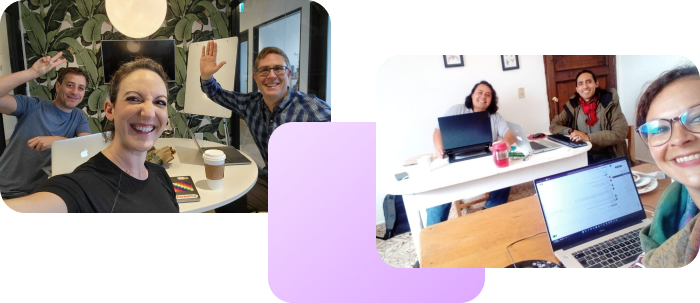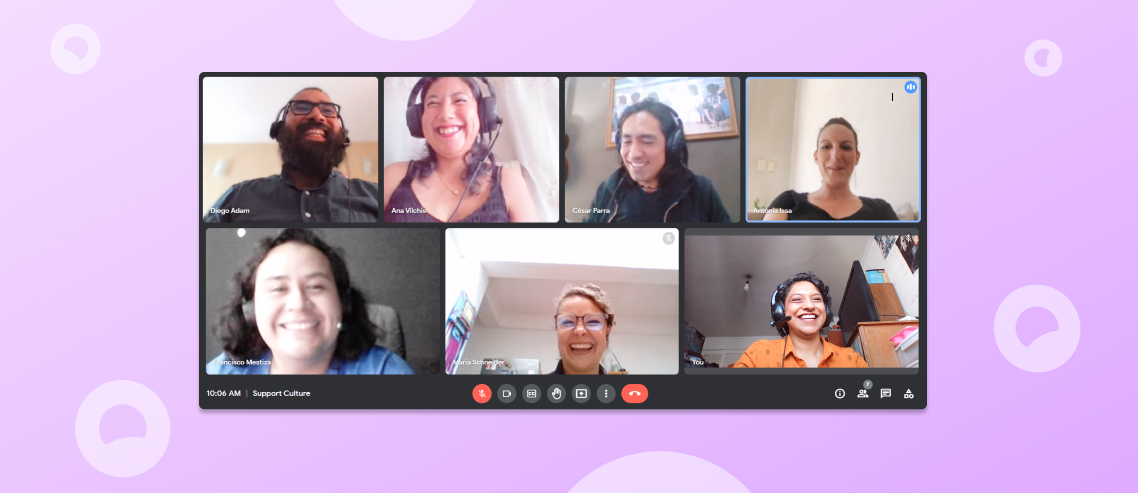How we built a top-performing startup team
 | By Antonia Issa, VP Support, Poparide |
When I started at Poparide a few years ago, I knew I was onto something that would make a huge difference in people’s lives.
From day one, I was drawn to the company’s vision of a world where we all share resources to help preserve our environment. This vision resonated deeply with my sense of responsibility towards the environment, and I wanted to help make travel more social, affordable and sustainable for everyone.
I was tasked to build a support team of individuals that share the same values and are motivated to work together to create positive change. To succeed, we required people that had more than just technical know-how; they had to truly understand empathy and be passionate about creating exceptional experiences for our members.

Hiring this team was a new challenge, so I reached out to an ex-colleague from Slack, Marissa Senzaki. Marissa was Slack’s first recruiter and people ops person when the team was only 45 employees in San Francisco and Vancouver. At that time, she was responsible for getting my resume to the top of the pile, interviewing me and helping me get my foot in the door in tech.
I admired her for taking a chance on me even though I had little experience in the industry. She recognized my passion for the work and everything I brought to the table, including my education, previous experience, and future ambitions.
Looking back, I’ve come to realize that our office at Slack comprised some of the smartest, kindest, and most humble people I’ve ever met, which was the result of some very intentional hiring by Marissa.
During a 45-minute call, Marissa shared some pro-tips and anecdotes from her 14 years of experience. I loved her approach, which I internalized and made my own. It has helped me hire some pretty fantastic people. Today I want to share with you what I’ve learned. Here are some of my top takeaways on how to build yourself a great startup team:
Quickly gauge interest level
When you start searching for candidates, carefully review application forms. Did they respond to everything? Did they put thought into their responses? This is a quick way to gauge how serious someone is about the job and the company.
Once you’ve created a shortlist of candidates, ask them flat out why they are interested in this particular role. Understanding their motives can help shed light on how serious they are about the work.
Extract values and find alignment
Although candidates should have the basic skills or transferable skills for the job, don’t let a missing skill in the job description knock someone out of the running. They can learn many things on the job. What is more important is that their values align with the company’s.
- Values are only as good as their actions. If there is an incongruence between what they are telling you and how they behave, it could indicate a lack of self-awareness.
- You can identify this mismatch by listening to the candidate’s stories and asking the same question in different ways. For example, if you want to investigate how someone feels about transparency, ask the candidate behavioural questions where they identify an example from the past rather than speaking in hypotheticals. This could include:
- a time when they provided candid or difficult feedback to a colleague and how they approached it
- how they communicated with their team and what communication channels they used
- how they feel about collaboration and examples of how they have collaborated with colleagues
- When you ask a candidate about situations in previous jobs that have caused them frustration, it becomes easy to connect the dots from a pain point to a value. Usually someone’s frustrations are triggered when something they value has been undermined. This can help uncover whether the candidate aligns with the requirements for the role. For example, a candidate may tell you that they didn’t like it when someone took the credit for another colleague’s idea, illustrating that the candidate values equity and giving credit where it is due.
Listen deeply and trust your gut
Hire people that you fall in love with (of course, not in a romantic sense). If they have a sparkle or something wonderful that makes you smile or that thing that words can’t describe but you’re excited about, you know you’re on to something.
- Listen carefully to their story and let them talk. As well as asking the more typical interview questions, take the time to dig deeper like an investigative journalist. Use the “five whys” to uncover the root cause of a problem and seek to understand how someone ticks. This can help you identify their values without them having to overtly express them.
- Ask the candidate about things that excite them and get them to lead you through a story of a successful moment they’ve had in the workplace. What was the problem they were trying to solve and how did they triumph?
- If the candidate were to dream big and could do anything, what would it be? Do any of those elements appear in this role?
Select for Self-Awareness and Emotional Intelligence
Self-awareness is key and is especially important in a high-pressure startup environment. Candidates need to understand their ticks, triggers, and tendencies and know what helps them manage their stress levels.
- Since they will be working in collaboration with a small team, they need to know how to communicate their strengths and weaknesses. A great way to screen for this is to ask them to recount a time when they received constructive criticism, how they dealt with it, and the steps they took to grow and improve.
- Screen for high emotional intelligence as that will help them adapt to different work cultures. The right candidate needs to be agile and resilient, particularly as a startup goes through different stages of growth and employees may need to reinvent themselves at times.
- Make sure that the candidate displays humility. Since no one likes working with an arrogant colleague, find people that are amazing at what they do but don’t consider themselves to be a world expert. Look for people that believe there are always new things to learn. This can be gleaned from listening to how candidates showcase themselves in an interview and how they attribute credit to accomplishments. Did they do it alone, or were they part of a team?
In summary, I cannot emphasize enough how important it has been for me to hire the right people for the Poparide Support team. These hiring tips were invaluable in guiding me towards building an incredible team, and I hope you find them helpful in building your own startup team as well.
I’d love to hear how you’ve found ways to hire a successful startup team and if you found this post helpful. Add your comments below!
